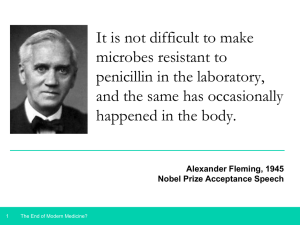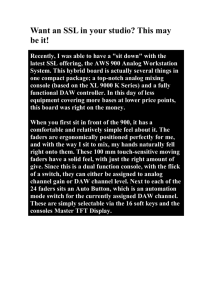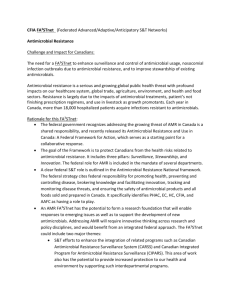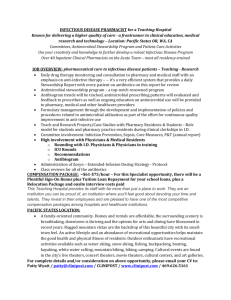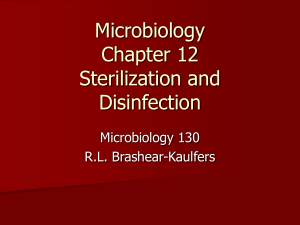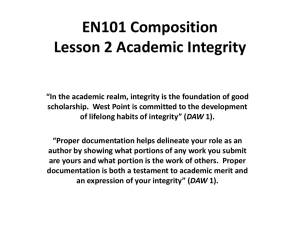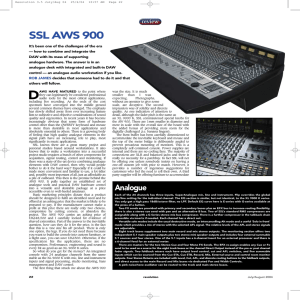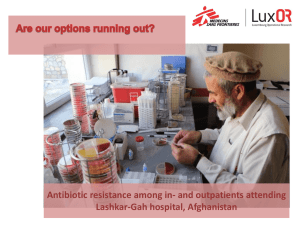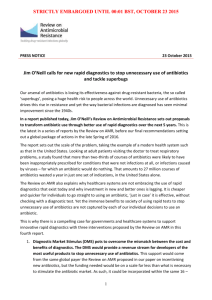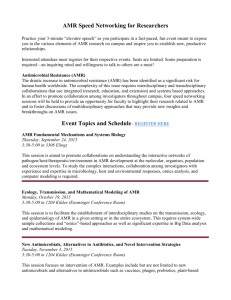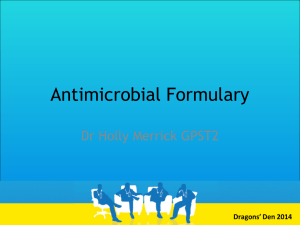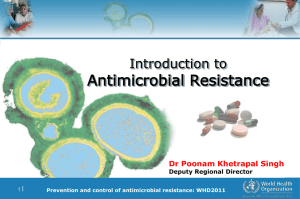Meeting of the Anti Microbial Resistance Taskforce, Bivda Offices
advertisement
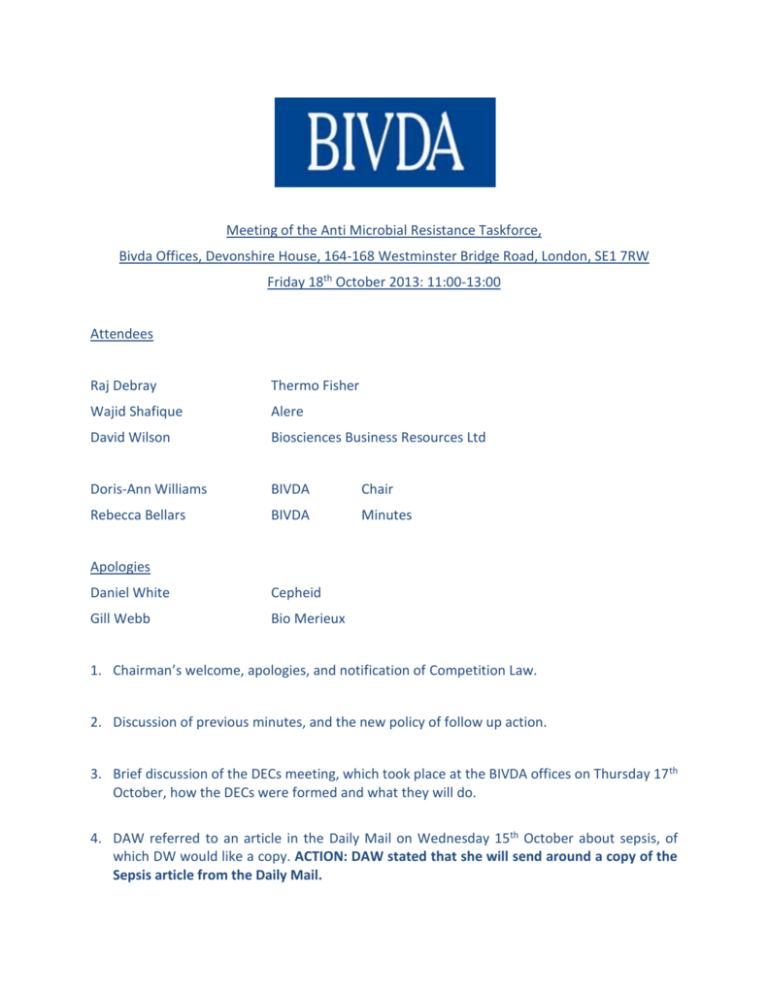
Meeting of the Anti Microbial Resistance Taskforce, Bivda Offices, Devonshire House, 164-168 Westminster Bridge Road, London, SE1 7RW Friday 18th October 2013: 11:00-13:00 Attendees Raj Debray Thermo Fisher Wajid Shafique Alere David Wilson Biosciences Business Resources Ltd Doris-Ann Williams BIVDA Chair Rebecca Bellars BIVDA Minutes Apologies Daniel White Cepheid Gill Webb Bio Merieux 1. Chairman’s welcome, apologies, and notification of Competition Law. 2. Discussion of previous minutes, and the new policy of follow up action. 3. Brief discussion of the DECs meeting, which took place at the BIVDA offices on Thursday 17 th October, how the DECs were formed and what they will do. 4. DAW referred to an article in the Daily Mail on Wednesday 15th October about sepsis, of which DW would like a copy. ACTION: DAW stated that she will send around a copy of the Sepsis article from the Daily Mail. 5. Attendees raised concerns about the different obstructions to the use of diagnostics and innovation in the healthcare sector. These obstructions included: Silo budgeting, lack of full understanding in Parliament of AMR, and non compliance with NICE guidelines. 6. Apparently companies find it difficult to show that different diagnostic tests will produce better outcomes, or which of their products will do the best job. The reason put forward for this difficulty is that there are many variables involved in AMR, and therefore it is difficult to measure outcomes. 7. Discussion was put forward as to how information can be provided to the Chief Medical Officer and the government, to show that diagnostics have a role against AMR. It was stated that unfortunately, following targets may be obstructive, as less sensitive tests may be used to meet targets. This was followed by discussion on broad spectrum diagnostics and their uses, and the length of time that it takes to obtain results. The Taskforce agreed that personalisation should be increased. 8. An additional point was made that it may be difficult to convince the general public, when they visit their GP, for example, that they do not need antibiotics. 9. DW put forward the idea of using the US or France as a case study, and WS explained further details of the Happy Audit, and said that countries involved in this study could be used as part of a case study, when writing to Sally Davies CMO. The Happy Audit is a project which looks into respiratory tract infections. They state that their objective is to improve the quality of diagnostic procedures and treatment of respiratory tract infections in order to ensure that only the right patients get the necessary antibiotics. Data has been taken from a number of countries, including Denmark, Sweden, Lithuania, Russia, Spain and Argentina. 10. DAW passed around extracts from the Autumn edition of Science in Parliament, a publication of the Parliamentary and Scientific Committee. This contained an article written by DAW, and other articles on the subject of antimicrobial resistance. 11. RD put forward ideas regarding a ‘fast track and review’ of diagnostics, to try to increase uptake by CCGs and Trusts. RD also discussed the idea of having a national database or framework for diagnostics. However, it was considered that physicians may not have the time to put data into the database. 12. DAW agreed that she was now in a position to write to the Chief Medical Officer, Sally Davies with case studies outlined by the Taskforce. DAW stated that there had now been enough discussion for her to put something concrete to the CMO. Action: DAW will write to Sally Davies Chief Medical Officer, following the Department of Health’s Five Year Antimicrobial Resistance Strategy. 13. Other companies who may be interested in joining the Taskforce were discussed, including Roche, Cepheid and Abbott. Action: RD will contact Roche about becoming part of the ARM Task force. 14. RB stated that the Science and Technology Parliamentary Committee wished to conduct an inquiry into AMR, and the six questions that they raised were circulated to the attendees. These were discussed, and while it was considered that some related more to Pharma, others will be answered and responses put to the Committee. BIVDA will submit the response. These should be submitted by November 6th 2013. The questions are as follows: a. How has antimicrobial resistance developed in the past decade? b. What are the gaps in our knowledge about antimicrobial resistance? c. Is there sufficient research and investment into new antibiotics or other treatments and methods to ensure continued protection against infection? If not, how could this be rectified? d. What measures (including behavioural change) have been most effective in controlling the spread of resistant pathogens, and could such measures be used to control other pathogens? e. What global coordination and action is required to fight antimicrobial resistance and is the UK contributing enough towards cross-border initiatives? f. What are the strengths and weaknesses of the Government’s 2013-2018 strategy for tackling antimicrobial resistance? What changes might be made to further strengthen the Government’s action plan? Action: RB and DAW will jointly draft a submission to the Science and Technology Committee based on the questions they have provided. 15. Discussion then centred around dealing with journalists. BIVDA does not commonly make use of press releases due to their being taken up by journalists who may not write a balanced article. However, it was stated that information may be widely circulated through them. 16. Chairman closed the meeting.
